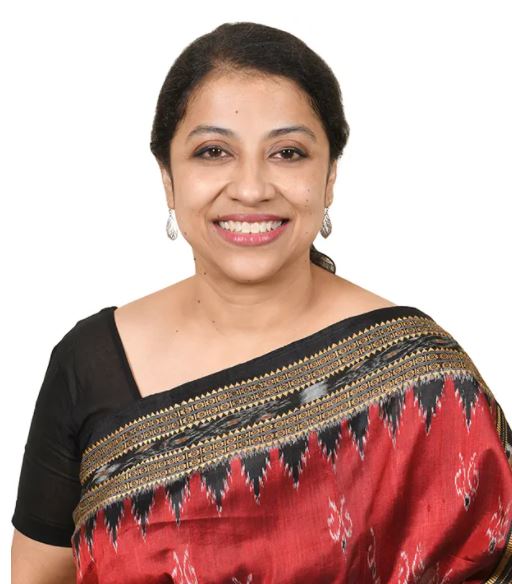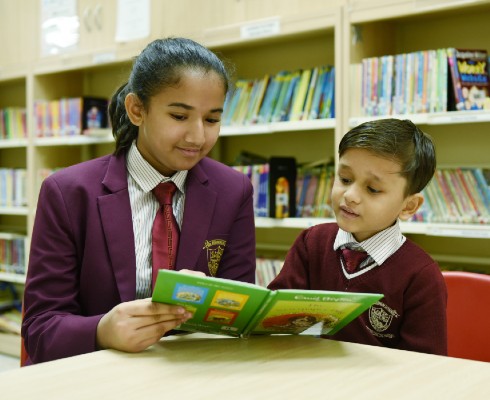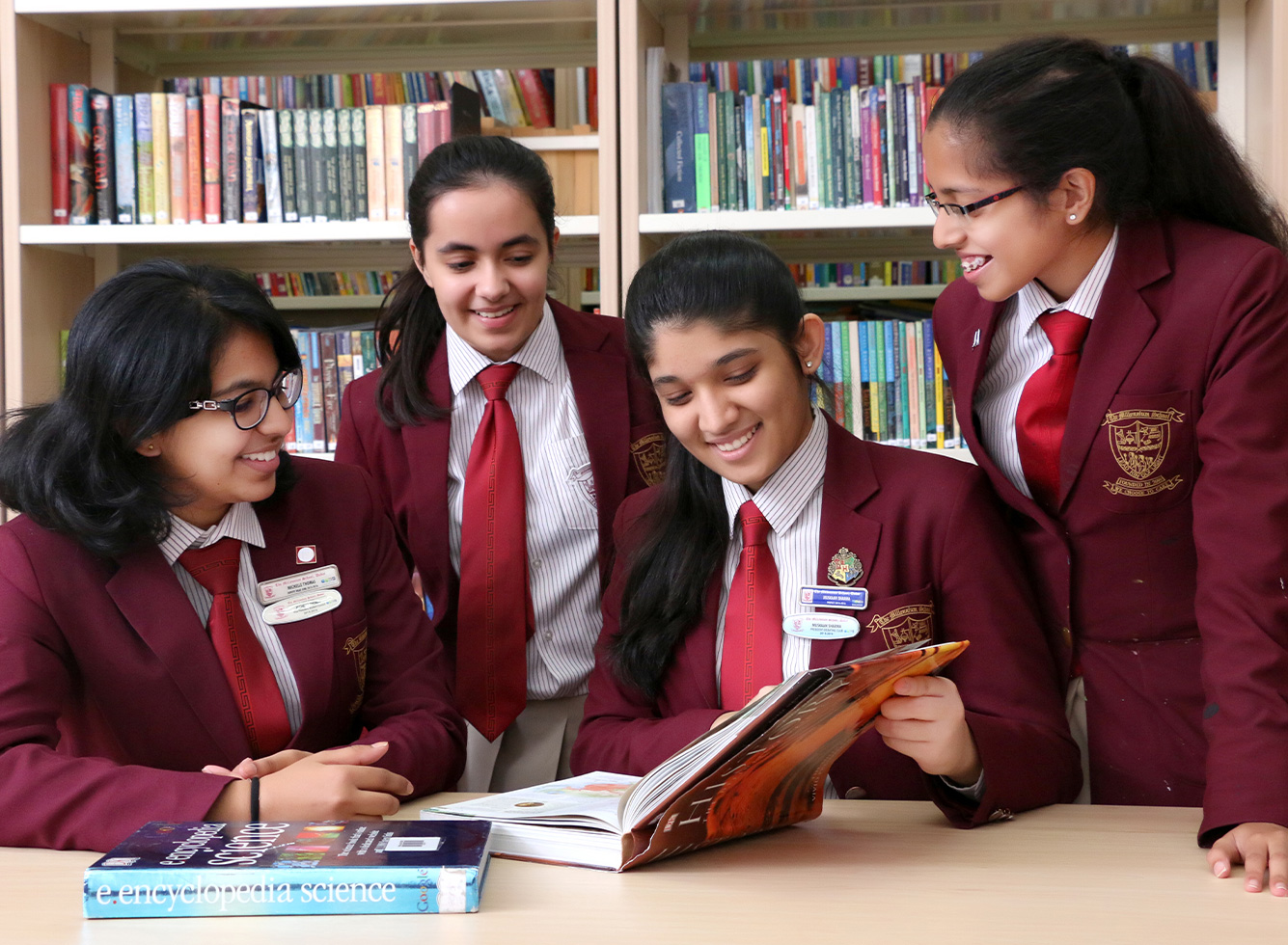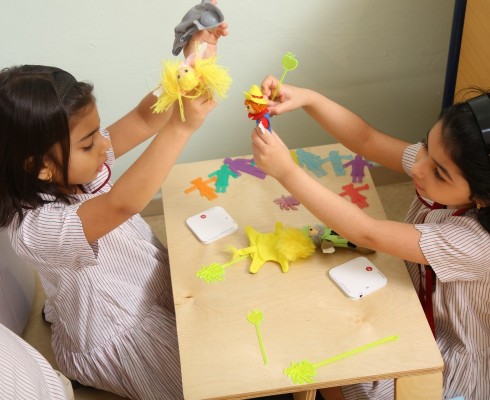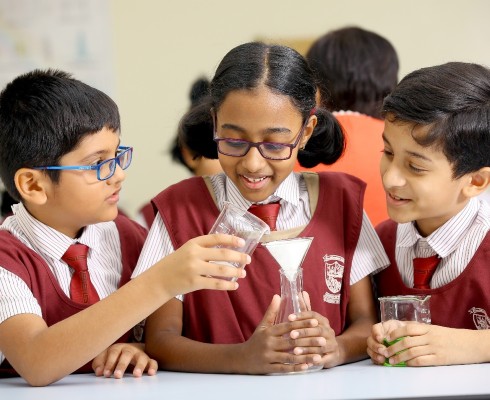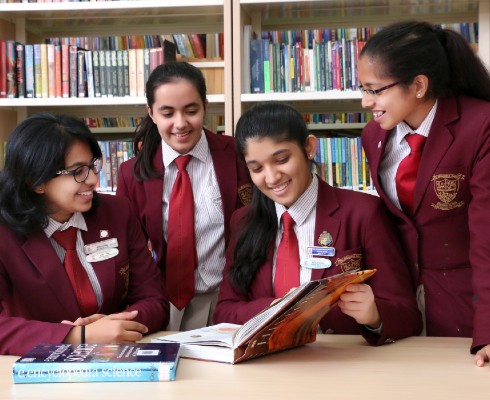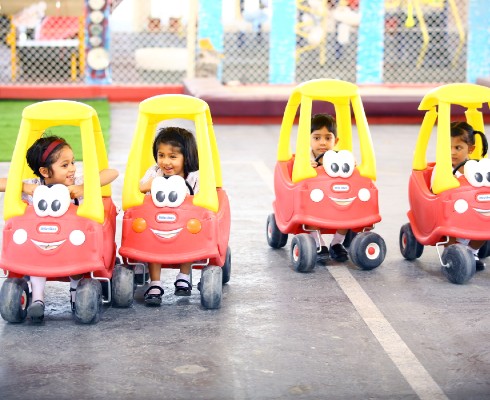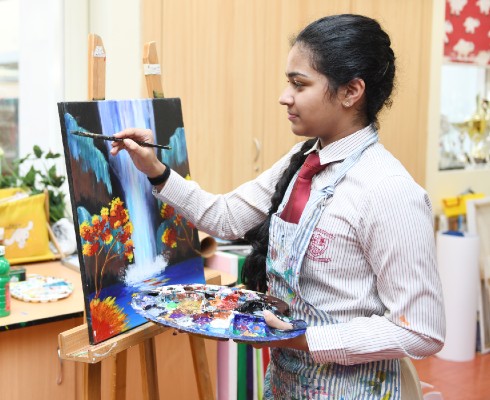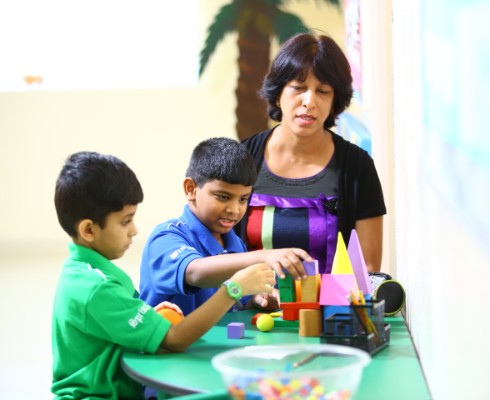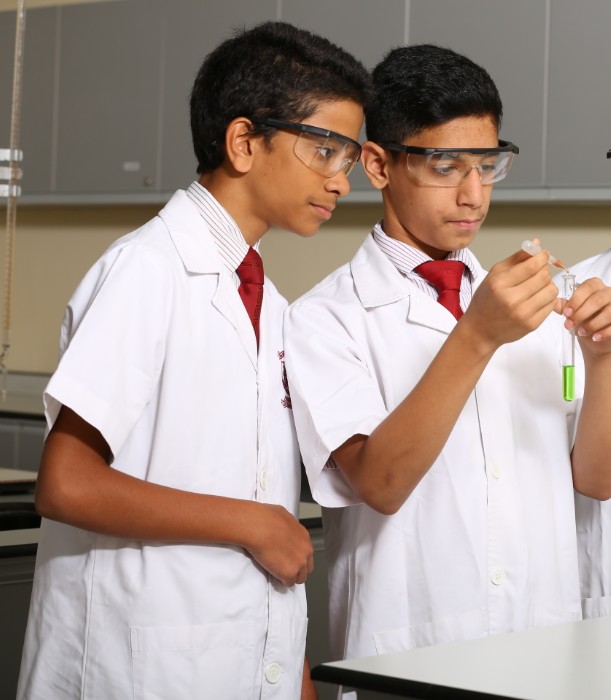
Middle School
Welcome to the Middle School!
In the Middle School years, the fundamental element of our students’ education is to prepare them for life outside of school. All aspects of the CBSE Curriculum are taught, providing a holistic educational experience as well as a diverse range of skills and experiences allowing students to further develop their love of learning, which is a wide-ranging, skills-based curriculum designed to allow students to apply their skills and knowledge to real life scenarios. The curriculum is enhanced and extended through research work, independent and collaborative learning. It focuses on supporting students to develop the understanding and skills they require to make healthy and safe choices that will enhance their own and others' health and wellbeing. We foster complex reasoning skills that are crucial to thriving in High School.
In these years, learning and teaching lay emphasis on intellectual challenge and encourages students to make connections between what they do in school and the world beyond the classroom.
Learning through Thinking
In middle school classrooms, we challenge our students’ thinking. If they are not thinking, they are not learning. Lessons are engaging, encouraging inquiry, creativity and risk-taking in a supportive atmosphere. Learning, of course, extends beyond the classroom and all students are involved in extracurricular and community-service activities. It is through these that they reinforce their leadership, collaboration, problem- solving and decision-making skills, as well as developing independence. It provides students with the opportunity to cultivate their critical thinking, research, communication, and collaboration skills needed to be successful in and outside school. Our extensive after school activities, the Skill Up Programme provide students with additional opportunities to develop skills and attributes outside of the regular classroom environment. There is a wide variety of activities and we value the importance of choice and variety for our students, allowing each student to choose their own activity to suit their own interests and passions. The curriculum in the Middle School has been rated as Outstanding by the DSIB.
Come, discover the Middle School!
Explore the Middle-School Curriculum
-
Islamic Education
Islamic Education is taught according to the guidelines stipulated by the ministry curriculum. The criteria namely Holy Qur’an, Hadith, Aqeedah, Fiqh, Seerah, Value and Etiquettes and Islamic Identity is taught across grades 6-8 during both the terms. Subject enrichment projects are also assigned to students in order to increase their knowledge about the religion and to enable them to apply the religious values learnt in classrooms on an individual and societal level. Additionally students of Islamic Education initiate and execute programs like holding Iftar gatherings and creating awareness about the Islamic Events like Ramadan, Eid, Isara wal Mi’raj across the entire school community.
-
Moral Education Programme
The Moral Education Programme (MEP) covers four pillars of teaching and learning: character and morality, the individual and the community, civic studies and cultural studies. The four pillars complement one another, using the lens of moral thinking and learning and building character. Underpinning the curriculum are the thinking, learning and communication skills relevant to the programme, which support development and progression through the middle school years.
-
Arabic
Students develop skills around the Listening, Speaking, Reading and Writing. The use of ‘I Read Arabic’, a reading program helps develop these skills. Specially designed workbooks make the learning of Arabic fun.
-
UAE Social Studies
Social Studies is a crucial part of UAE education that teaches students how to be well informed, critically thinking citizens of their world. The primary purpose of the UAE social studies is to help young people make informed and reasoned decisions for the public good as citizens of a culturally diverse, democratic society in an interdependent world.
The rationale for this is to provide students with in-depth knowledge, skills and understanding in history, geography and civics, which emphasize the links and relationships between diverse groups, people, science and society. Teaching UAE Social Studies enable the Students to contribute, as responsible citizens and residents of the UAE, to the building of a cohesive society that is inclusive of all, while preserving the UAE culture, heritage and traditions.
-
Social Studies
The Social science is a major category of academic discipline, concerned with society and relationship among individuals within a society. The aim of teaching Indian Social Studies in Middle School is to inculcate social values, personal values, constitutional values as well as the awareness of nation programs and policies. India is a diverse country with varied cultural and socio-economic backgrounds. It is imperative for young children to be aware and accepting of this diversity.
-
English
Through the study of English language and literature, students develop their reading, writing, speaking and listening skills. They discuss and explore how the language, form and structure across a range of literature are crafted in order to impact the reader. Developing effective and coherent writing with accurate grammar, punctuation and spelling is a key skill and students will also acquire and apply a wide vocabulary alongside knowledge and understanding of grammatical terminology, and linguistic conventions for reading, writing and spoken language. The course aims, essentially, at promoting the higher-order language skills, develop greater confidence and proficiency in the use of the language skills, build communicative competence in various lexicons of English and develop ability and acquire knowledge required in order to engage in independent reflection and enquiry. Students also develop the skills to analyze texts to extract meaning through gist and inference, improve memory skills as well as expressing and justifying points of view, attitudes and emotions.
-
Mathematics
The principles we follow at middle school derive from the latest research on how students learn best through productive struggle, rich tasks and mathematical discussion. Having built strong foundation the students learn Arithmetic, Geometry, Algebra, Probability and Statistics as aligned with CBSE Board. To enhance this, varied pedagogical practices, integration of technology, lab activity and art integration is on constant use.
The unique approach used in teaching mathematics at middle school ensures that students not only meet the standards of CBSE curriculum, but they also master them. Students have ample opportunities to learn by doing math, solve problems in the mathematical and real world contexts using constructive arguments and viable mathematical language. Our curriculum facilitates active learning to help students collaborate and engage with each other, think critically and gain deeper understanding of concepts.
-
Science
Students study science as well developing specific skills linked to the distinct disciplines of biology, chemistry and physics. Within their study students are encouraged to develop planning and organisational skills for practical work, the awareness of hazards and how to work safely, enhance observational skills to record changes and results, be able to work confidently and accurately with data, and gain knowledge, recognition and understanding of scientific equipment. In addition to this our students gain the ability to critically evaluate their work and gain an appreciation of how scientific theories are developed, challenged and accepted as well as an acute awareness of the role of science in all aspects of life.
-
Visual Art
Art is an integral part of our students’ holistic learning experience. Through their study, they develop numerous transferable skills and will learn to express their thoughts and choices confidently; apply creative approaches to problem solving and critically analyze their own work as well as the work of others. They will also consider and develop original ideas and will experiment with colour & creativity.
-
Performing Arts (Music)
Over the course of study in middle school, students will learn about the basic elements of music i.e pitch, rhythm, and dynamics. Through the study of music, students will develop and enhance their ability to sing in ensembles and as soloists. The curriculum will include one foreign language song, based on the listening skills session taken in Term 1, which the students will analyze, translate and sing.
Songs based on the value of the month will also be taken. Students will acquire knowledge of music and how it relates to its cultural context whilst developing skills to listen differently, to obtain a deeper appreciation of the music they hear. In addition, many cross-curricular skills are developed through musical study such as numeracy, problem solving, critical reflection, team-work and self-management. Music also enables students to develop concentration levels and memory and resilience, leading to enhanced intellectual, personal and social development.
-
Information and Technology
Students develop the ability to familiarize with basics operation of computers and to navigate the file system. They are trained to create and edit documents, spread sheets, and presentations. The ability to perform basic data manipulation using spread sheets and use Indian languages in documents. Students get equipped to send and receive emails, follow email etiquette, and communicate over the internet.
-
Second Language (Hindi, French & Malayalam)
Within languages, our students gain the ability to communicate while focusing upon listening, speaking, reading and writing skills. Through their studies they will also gain an insight into, and a positive attitude towards, other cultures and practices. Students also develop the skills to analyze texts to extract meaning through gist and inference, improve memory skills as well as expressing and justifying their points of view, attitudes and emotions.
-
Physical Education
Physical Education is a vast subject and it has been given importance from ages. Modern Physical Education stresses on balanced development of body and mind. The students are bound to understand the importance of nutrition, fitness and healthy living. The students will also know how to play various sports and will have a greater understanding of every game. All students will have a complete knowledge about all the games and its training methods. Through their experiences of sport they develop agility, balance, co-ordination, speed, strength and endurance. In addition, key transferable skills such as leadership and teamwork which are integral to Physical Education lessons are developed.

